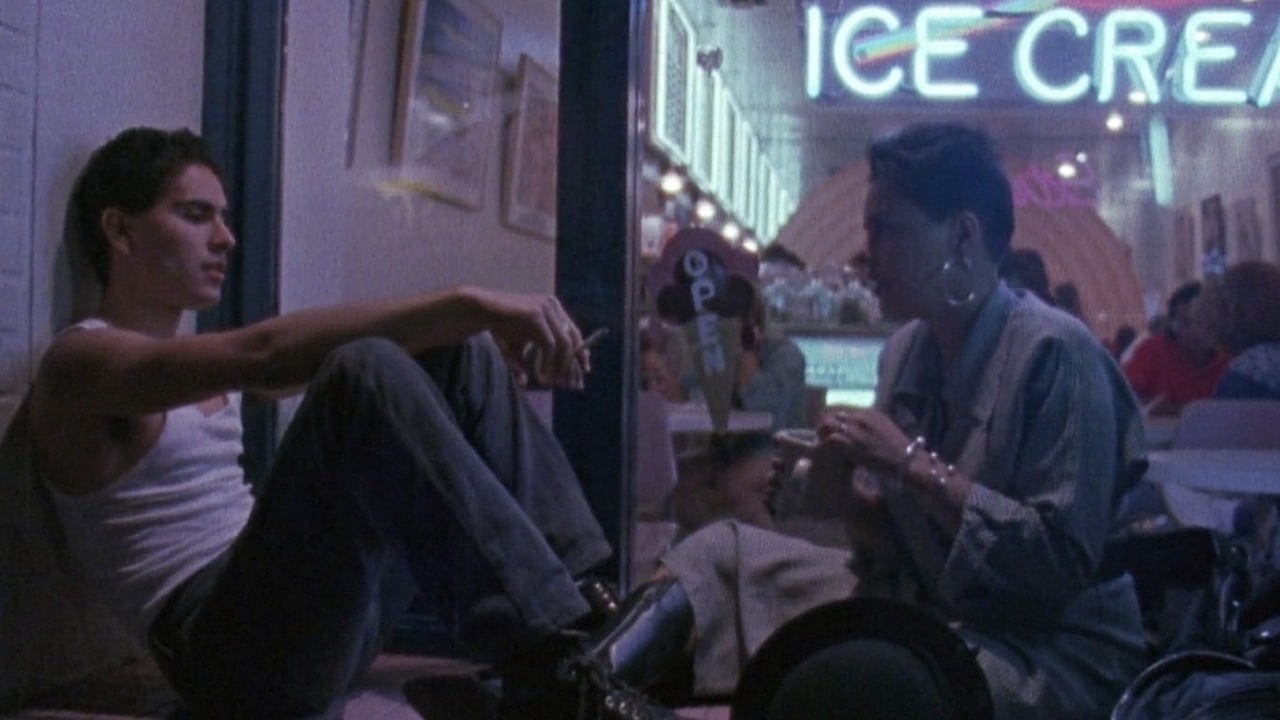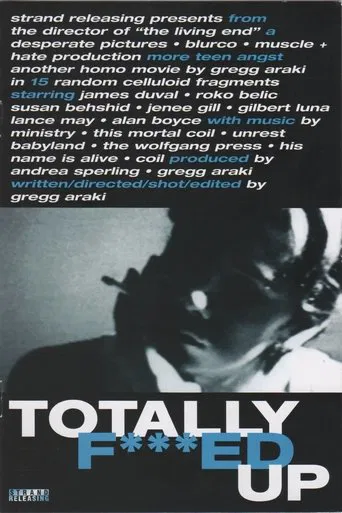

Gregg Araki is a well known director for his controversial take on youth and homosexuality. There seems to be, however, a certain thematic present in most of his movies. "Totally F***ed Up", along with "The Doom Generation" and "Nowhere", is part of what one might denominate the James Duval Era or as the director has named it: "Teenage Apocalypse Trilogy". In these movies, the actor interprets different versions of the same character: a confused young man exploring his sexuality and trying to find his place in the world. It may sound predictable, but when one is in front of a Gregg Araki's production nothing is predictable.It would be unfair to claim that James Duval's character is the protagonist, certainly "Totally F***ed Up" is planned and executed as a polyphonic and multivalent narrative, and from the very beginning it showcases a cast of young people sharing their voices and thoughts with the spectator. They're all main characters, and that's part of the film's charm. Polyphony, as literary critic Bakhtin would explain it, implies a diversity of point of views and voices, there is not a unique vision but multiple visions. This goes beyond a simple angle change or a reinterpretation of an act from another character's perspective. Bakhtin said that no human voice could exist in itself, that in order for one human voice to exist other voices (dozens or thousands, the amount doesn't alter the equation) would be indispensable. According to his conception, truth is not what most people agree on, but rather a set of affirmations subtly linked with one another, even if sometimes they would appear to harbor contradictions or inconsistencies.It is in this sense that "Totally F***ed Up" is a polyphonic story. It entangles and exploits the lives of gay and lesbian teenagers. It merges conflict, sexuality and teen angst in one solid narrative. At moments it may rely too much on experimental approaches, but it catches the attention of the viewer from the first image. And it's that first image that functions as the prophecy from the Oracle of Delphi in Greek tragedies. However a prediction of something that will only happen in the last minutes is only fitting in an scenario in which sometimes the characters act like chorus members in a classic Greek tragedy. The chorus was essential for Greek tragedy because it allowed spectators to become emotionally involved while at the same time remain intellectually separated and removed from the theatric reenactment. The chorus is the one voice, pronounced by many, that tells the spectator when to shed a tear or when to sigh in relief, it accompanies the cathartic process but gives full power to the spectator, allowing him to disconnect himself at any time.These young homosexuals live in constant frustration. Whether it is the impossibility of the lesbian couple to raise a child together, or the impending cheating that shatters the gay couple, or the father's prejudice that ends up in the expulsion of his own son, or the inability of young Andy (James Duval) to define what it is he wants. Because, after all, Andy is not only struggling against his own insecurities and fears, he is also fighting against the structures, against what Lacan would call "reality"; it's perfectly understandable, then, that the ugliness of the Lacanian "real" should erupt in Andy's life. Classic Psychoanalytic theory used to say that homosexuality was the symbolic death of the individual, that due to the wrongfulness of their sexuality, homosexuals were dead in the eyes of society, and forever condemned to be outcasts. "Totally F***ed Up" is full of moments in which the spectator can contrast these kids experiences against the ideas and acts of other people, from the Southern politician that compares a gay pride to a march to hell, to the ads that insist AIDS is divine punishment, to the murderer of a gay man that says it's better to have one dead guy than one living gay, to the group of gay bashers that attack one of the main characters, etc.It's all there, the chorus stratagem that reunites a Bakhtinian polyphonic truth and the frustration that comes from this traditional psychoanalytical accusation of symbolic death, that at last proves that one single man, one individual's fierce fight against reality, is not enough and can be sadly condemned to the grimmest fate.
... View MoreTracing the progress of innovative filmmakers is a pleasure for movie buffs. Gregg Araki developed a unique voice in film in the early 1990s (this film dates back to 1993), a voice that maintained a sense of immediacy with his actors who he directed with his hand held camera in a manner that gave the illusion that the 'script' was extemporaneous. Careful not to assign controversial roles to inadequate talent, Araki gathered a group of young actors and pulled the very best from them. Many of these early actors still maintain presence in Araki's prolific flow of films.As is so often the case with Araki's stories, TOTALLY F***ED UP deals with gay sensibilities in a way that displays the entire spectrum of positive and negative response to his characters. He does not preach: he simply voyeuristically reveals lifestyles as though he were a hidden personage who just happened to fall into private moments and turbulent emotions. In this film Araki divides the examination of six teenage gay kids (four boys and two girls) into 15 dialogues, each representing an aspect of what faces his characters and how they cope with being on the fringe. The 15 episodes are related because the characters remain the same and it is this unique manner of making his story that has continued to be a trait of Araki's later, more linear films.We meet each of the six characters in an interview situation, with only the minimal amount dialogue conveying the maximum amount of information. The primary character is Andy (a superlative James Duval) whose view of life is bleak to say the least: Andy doesn't believe in love, in commitment, believes he is bisexual even though he has never stepped out of his same-sex playing out, grows to depend on his friends, falls in love with a sweet talking fellow Ian (Alan Boyce) only to discover Ian is not at all monogamous, and finally feels the pain of heartbreak and makes a decision about life that ends the film. The other characters include Michele (Susan Behshid) and Patricia (Jenee Gill) who are lesbian lovers and stable figures for the boys, desiring to have children and a wholesome life without the need for male penetration!; Steven (Gilbert Luna) and Deric (Lance May) who are coupled but come apart when Steven has an affair and Deric is gay-bashed; and Tommy (Roko Belic), the one who falls in love too easily with every one night stand he has.The episodes deal with the characters' sexual attitudes, AIDS, life on the streets, drugs, parental alienation, loneliness, abuse, suicide, and the desperate need for extended family. With Araki's technique we come to care strongly for each of these disparate kids: by the end of the film they feel like close personal friends of ours.The filming technique is choppy and slips out of focus and seems to idle like a malfunctioning engine at times, but in Araki's sensitive hands these aspects add to the tension of the story. Clearly Gregg Araki is a gifted artist, and his films subsequent to this successful one serve to prove his growth and increased power of heart to heart communication. Highly recommended. Grady Harp
... View MoreI thought the movie, "Totally F***ed UP," was a rather good movie. The movie attempts to look at the lives of some troubled gay teens and how they attempt to deal with the complexity and pressures of homosexuality in advent of the approaching new millennium. The interviewing style of the movie was a different approach to viewing a teen movies compared to the main stream movies formulas, but I found the movie entertaining in spite of the narration, and at times, it was very funny. If you ever really been around the teens of today, they do act and talk like these teens. All teens have problems trying to adjust and assimilate into adult life. Having the added pressure of being gay, makes their lives even more complex. I could identify with some of the characters and some of their actions and reactions and their problems trying to become independent, gay adults. I first saw this movie on the Independent Film Channel of cable and eventually I bought my own DVD copy, but I'd like to see more movies like this and more from the writer and director, Gregg Araki. Who knows, eventually these movies will be in main stream too and not just presented only on the Independent Film Network.
... View MoreI've seen all of Gregg Araki's Films except the ones before "The Living End" and I thought all of them were fantastic. But not this one, it is a peice of garbage. First of all, this film gives no incite whatsoever on what it is like to be a gay teen. It never delves deep into the characters to show how they feel, and in the end we are left wondering what the hell happened. Ok so I saw the film about two years ago, so I can't comment fresh after seeing it. I have never been so aware of a film being shot on film as I was with this one. Araki uses WAY too many close-ups (which work for his other films) but in this one all there seems to be is CLOSE-UPS, CLOSE-UPS, CLOSE-UPS! It drove me insane. This probably would have worked if ANY of the characters were interesting in the slightest, but instead we are treated to LONG close-up pseudo documentary like shots of boring dialogue delivered by boring actors. I am so angry that I spent 100 dollars to import two copies of this for me and my friend, who is also a big Araki fan and couldn't even finish watching this piece of crap. Final Verdict, you will most likely not enjoy this film even if you are a big Araki fan. watch his other movies instead (except for Splendor ech!)
... View More